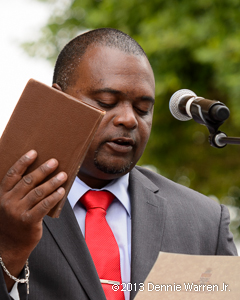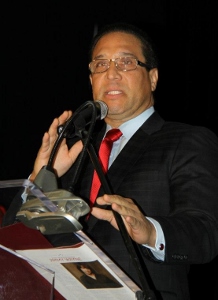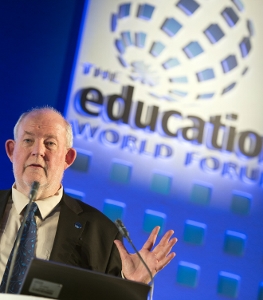 Politics
Politics

Alden to face HARDtalk
 (CNS): Although the Cayman Islands premier recently accused the local media of wanting to take "pot shots" at government when he made it clear that regular press briefings are now a thing of the past, Alden McLaughlin is, however, set to make an appearance on one of the BBC’s flagship interview programmes, where he is likely to face more than pot shots. Leaving for London on Friday evening for a conference on combating global corruption, where he is delivering a keynote address next week, the premier will also be taping an interview for HARDtalk with host Stephen Sackur (left), following an invitation to talk about Cayman’s tax haven label, among other issues.
(CNS): Although the Cayman Islands premier recently accused the local media of wanting to take "pot shots" at government when he made it clear that regular press briefings are now a thing of the past, Alden McLaughlin is, however, set to make an appearance on one of the BBC’s flagship interview programmes, where he is likely to face more than pot shots. Leaving for London on Friday evening for a conference on combating global corruption, where he is delivering a keynote address next week, the premier will also be taping an interview for HARDtalk with host Stephen Sackur (left), following an invitation to talk about Cayman’s tax haven label, among other issues.
In a release from his office McLaughlin said he was “humbled to have been asked to appear on HARDtalk to tell not only Cayman’s story, but that of the other overseas territories,” as it is understood he will be the first OT leader to appear on the show and face Sackur’s pointed questions.
“It’s a pretty big stage,” said thepremier. “It’s my honour to represent the Cayman Islands and the overseas territories. We all have a good story to tell,” he added.
Topics to be discussed include Cayman’s status as an international finance centre, the use of the term “tax haven”, international efforts to curb tax avoidance, banking regulation in the Cayman Islands and reported recent tensions between Caymanians and the expat community.
While in London, the premier, who will be travelling with the Cabinet Secretary Samuel Rose and Senior Political Advisor Roy Tatum, also plans to meet with officials from the Foreign and Commonwealth Office.
The main purpose of the visit, however, is for McLaughlin to deliver an address at the corruption conference hosted by Chatham House, "Combating Global Corruption: Shared Standards and Common Practice", which is being held on Monday and Tuesday, 3-4 February. McLaughlin will address Session Five of the conference, "Recovering the Proceeds of Corruption".
The premier said he was delighted to accept the Chatham House invitation and for the opportunity to tell the world of the successes of the Cayman Islands on the global financial stage.
“It’s rare that a leader of a UK territory has the opportunity to address anti-corruption initiatives from a global perspective,” McLaughlin added.
This conference will examine action to tackle global corruption and consider the role of governments and businesses. Participants and speakers will critically assess current and emerging international efforts and consider their consequences for future business practice and governance.
Chatham House is home to the Royal Institute for International affairs, an independent think tank and organisation that analyzes, informs and influences debate on the hope for a prosperous and secure world for all. Engaging governments, the private sector, civil society and members about developments in international affairs, it produces analysis of critical global, regional and country-specific challenges and opportunities and puts forward possible solutions on the world stage.
Other keynote speakers at the conference include Angel Gurria, Secretary General for the Organization for Economic Cooperation and Development; Dr Mo Ibrahim, Founder and Chair of the Mo Ibrahim Foundation; and Ngozi Okonjo-Iweala, Minister of Finance, Nigeria.
During the absence of McLaughlin and Rose, Deputy Premier Moses Kirkconnell will be the acting premier and Robert Lewis will act as the cabinet secretary.
Officials said McLaughlin will depart on Friday, 31 January, but did not state when he is expected to return. The interview with the BBC will take place on Tuesday but no date has been confirmed for when the show will air.

Ethics bill placed on LA agenda
 (CNS):Following the revelations in the auditor general’s most recent reports that there is a failure among government departments, and in particular its statutory authorities and government companies, regarding ethics and values, the passage of the Standards in Public Life bill will come as a rude awakening for some board members and government employees. The bill is set down on today’s agenda, when members of the Legislative Assembly meet at the country’s parliament to debate this as well as two police bills. The long awaited ethics law will raise the bar for everyone who has a part to play in government. Replacing the Register of Interest Law, it will widen the net of public officers who will need to disclose their interests.
(CNS):Following the revelations in the auditor general’s most recent reports that there is a failure among government departments, and in particular its statutory authorities and government companies, regarding ethics and values, the passage of the Standards in Public Life bill will come as a rude awakening for some board members and government employees. The bill is set down on today’s agenda, when members of the Legislative Assembly meet at the country’s parliament to debate this as well as two police bills. The long awaited ethics law will raise the bar for everyone who has a part to play in government. Replacing the Register of Interest Law, it will widen the net of public officers who will need to disclose their interests.
All public officers holding the post of heads of departments, sections and units or more senior positions plus those acting in those positions, as well as board members of statutory authorities, government companies and constitutionally created commissions, candidates nominated for election, and both elected and official members will all need to declare their interests.
“This bill ensures that conflicts of interests are properly addressed,” said Alden McLaughlin, the premier of the Cayman Islands. “I think this is a very important piece of legislation and part of the infrastructure of good governance.”
Divided into eight parts dealing with standards in public life, conflicts of interest, register of interest, powers of investigations, and the appointment, responsibilities and compensation of boards, the bill formerly adopts the seven principles of public life, known as the Nolan Principles.
This required public servants to follow principles of selflessness, integrity, objectivity, accountability, openness, honesty and leadership.
“The bill is needed to ensure businesses and investors who want to do business in the Cayman Islands that persons in public life are held to the highest standards; therefore, reducing the opportunity for corruption,” McLaughlin said in a release from his office on the eve of the legislation coming before the Assembly.
Certain of passage, the law has been in the works for some four years after the 2009 Constitution established a Commission for Standards in Public Lifeto supervise the operation of registers and to investigate breaches of established standards in public life. The law, once passed, will enable that commission to meet its constitutional mandate.
“It’s taken a long time to come, but this administration is determined that we pass this legislation to ensure good governance in the Cayman Islands,” McLaughlin added.
The bill will require that within 90 days of assuming office and annually thereafter anyone with any responsibility in public life to declare their income, assets and liabilities, not just for themselves now but for connected people and family members.
In the case of candidates for elections, the declaration must be made before filing nomination papers. Annual declarations will be made within 30 days of the last day of June, beginning on 30 June, 2014, and will be available for public inspection at the Commission Secretariat. It is anticipated that the Commission will also make them available via its website.
This will be a huge improvement on the current situation regarding political representatives. While they do fill in forms that are filed at the Legislative Assembly, anyone wishing to see must make an appointment and no one is allowed to make any copies of the documents contained in the file.
The bill also covers the appointment of board members to ensure that they have the skills, knowledge and integrity to carry out the duties required of the position in a highly competent and politically neutral manner and that they also avoid any direct conflicts. Members of boards will be required to include in a declaration any interest where there is a possible or perceived conflict with their function on the relevant board.
Outlining how to handle conflicts that arise during the course of a meeting or a person in public life’s day-to-day work, the bill also allows for the removal of board members in instances where it is unsuitable for that person to continue to serve or a conflict of interest has arisen that would bring disrepute to the board.
Once passed, the law will give the commission powers of investigation over people suspected of breaching the law, based on the commission’s own initiative or from allegations made to the commission. The commission will be able to summon witnesses, require the production of reports, documents, etc, and take any other such necessary actions needed. Another important factor is the lawful protection of whistle-blowers, as detailed in the Freedom of Information Law.
It will be an offence to refuse to make a declaration, file a false declaration or fail to provide or provide false information to the commission during an enquiry. The bill allows for fines ranging from $100 a day to $50,000 and/or terms of imprisonment of two years depending on the breach. A member of the Legislative Assembly may be suspended from sitting and voting if ordered by the Assembly for a breach of the bill.
See bill attached

Suckoo joins up with Ozzie
 (CNS): Despite bing one of the youngest members of the Legislative Assembly and a back-bench government representative, Alva Suckoo is getting around government. Having stepped in to take the reins at the Education and Employment Ministry recently, when both the minister, Tara Rivers, and her councillor, Winston Connolly, were overseas, he is now working alongside the health minister. Already appointed as a councillor in the premier’s Home Affairs Ministry, working on e-government and computer services, Suckoo will now also be working with his Bodden Town colleague, Osbourne Bodden, focusing on sports, youth and culture.
(CNS): Despite bing one of the youngest members of the Legislative Assembly and a back-bench government representative, Alva Suckoo is getting around government. Having stepped in to take the reins at the Education and Employment Ministry recently, when both the minister, Tara Rivers, and her councillor, Winston Connolly, were overseas, he is now working alongside the health minister. Already appointed as a councillor in the premier’s Home Affairs Ministry, working on e-government and computer services, Suckoo will now also be working with his Bodden Town colleague, Osbourne Bodden, focusing on sports, youth and culture.
Bodden said he was happy to share his workload with his constituency colleague.
“He shares some of my passions in those areas and he’s already been helping. He’s a very able and committed representative and he will add much to the good services we already provide in these areas,” the minister added.
As a councillor, Suckoo will attend meetings and events for Bodden. His appointment was made official Friday and announced in Tuesday’s Cabinet. During the same meeting all the new ministers were sworn in as Justices of the Peace and have been undergoing training for the role.
Chamber boss agrees OMOV can wait
(CNS): Despite leading the charge in the campaign leading up to the national referendum to introduce one man, one vote (OMOV) in July 2012, Johann Moxam said that he agreed with the recent comments by the premier that there is plenty of time to introduce the voting system before the 2017 elections and that there are other priorities that must be addressed. Although others have raised concerns that the government has not given any indication of when it will address the issue and that time is needed for its implementation, Moxam, who is now the Cayman Islands Chamber of Commerce president, says other issues are more important.
The Chamber has always supported the implementation of OMOV and single member constituencies for all electoral districts. But while Moxam urgeds the elected government to implement electoral reform before the next election in 2017, he said it still had three more years to bring the necessary changes.
“We are hopeful that they will fulfill their campaign promise,” Moxam said, as he pointed to other more urgent issues.
“The Chamber Council agrees with the premier that the national priority must be focused on getting unemployed Caymanians back to work and the local economy,” he stated. “This can only be achieved by way of extensive government reform to redefine and clarify the roles and the functions of the National Workforce Development Agency and the Immigration Department with specific and viable goals to get unemployed Caymanians back to work.”
Moxam once again emphasized the concerns of the Chamber about the cost of doing business, the cost of living and the heightened level of crime against businesses, which he said are of continuing concern to the business associations members.
“Public sector reform is critical to the business sector and the future of the Islands. We call for further action and would like to see ongoing transparency as to the progress we are making,” Moxam added.

Press briefings ‘pot shots’ at government, says Alden
 (CNS): The regular TV press briefings originally instigated by the former PPM administration, adopted and dropped by the McKeeva Bush led UDP government and then reinstated by the minority Cabinet last year will not be returning. Once a staunch advocate of the briefings, Premier Alden McLaughlin said his government would answer any press enquiries when they were made but he did not see a need to re-establish weekly briefings just so the media could take "pot shots at government". Although the PPM had said it would hold regular briefings, if not necessarily on a weekly basis, since coming to office the ministers have held only specific calls, where the media have been directed to ask only relevant questions to the press briefing topic.
(CNS): The regular TV press briefings originally instigated by the former PPM administration, adopted and dropped by the McKeeva Bush led UDP government and then reinstated by the minority Cabinet last year will not be returning. Once a staunch advocate of the briefings, Premier Alden McLaughlin said his government would answer any press enquiries when they were made but he did not see a need to re-establish weekly briefings just so the media could take "pot shots at government". Although the PPM had said it would hold regular briefings, if not necessarily on a weekly basis, since coming to office the ministers have held only specific calls, where the media have been directed to ask only relevant questions to the press briefing topic.
On Wednesday, however, when the premier appeared alongside the deputy governor to talk about and answer questions regarding the auditor general’s latest reports on the shortcomings of governance, CNS asked the premier if press briefings would be returning and for answers to a number of unanswered questions that have been submitted over the last few months.
McLaughlin dismissed the need for regular briefings.
“If the media has questions, let us have them. I am not prepared to engage in a back and forth and let the media take pot shots at us,” he said.
When pressed, he gave short answers to some of the questions that CNS has submitted, including details on the government’s plans for one man, one vote and the state of the Dart talks, but the premier made it clear that there was little he could say on the subjects, which was why the questions had not been answered.
During the election campaign the PPM had highlighted their introduction of weekly briefings as a positive factor in their preference for open and transparent government. They were held, the party said, to advise the media and country of government actions and activities.
“One of the first changes the PPM government introduced was a weekly press briefing at which journalists could ask what they wanted,” the party manifesto from the 2013 campaign states.
Although the current premier has not resorted to televised national statements since taking office, an issue he criticised the former premier over, he has utilized his press secretary to send out statements to the media on issues such as the immigration changes and other key policy decisions. In such cases, the media then has to chase the premier, other relevant ministers or senior civil servants regarding any questions arising.
Disappointed about the position taken over communicating with the media, CNS reporter, Wendy Ledger, said, "Everyone in the local press appreciates that government ministersare busy and feeding the ever-hungry news beast is not a priority for them.
“But getting questions answered in a timely fashion is never easy so we end up calling and pestering busy politicians for answers,” she said, adding that while some government ministers and officials are very quick and helpful answering enquiries, on some of the more sticky issues government has been less forthcoming.
“It may not be their priority to answer us but it’s our job to press,” said Ledger. “With a regular briefing we can ask all the questions and raise all the topical queries at one time when we know we will be meeting with government ministers. This is an advantage for them, too, as it means they won’t be fielding calls and emails all the time when they are busy.
“It avoids us all constantly, as individual reporters, often asking very similar questions and the same ministers then having to repeat the answers. It would also prevent us from having to resort to the tired lines saying we have contacted the relevant minister or official but don’t have a response when we run reports on issues of public interest and concern,” she added.
Ben Meade, the news director Cayman 27, also had some concerns. He said that the team’s reporters have not had a problem with access to the premier and some of his cabinet ministers but he was hoping that McLaughlin would reconsider his position.
“I trust that this will continue despite his recent position on the press briefings. However, I find it unfortunate that the premier sees it fit to view press briefings as an opportunity for members of the press to 'take pot shots' at him. Part of our role in the media is to hold public officials, elected and otherwise, accountable on behalf of the Cayman public. Regular press briefings provide a great avenue for this and I hope he seriously reconsiders his position on this matter," he told CNS.

No progress in Dart talks, says premier
 (CNS): The talks between the PPM administration and Dart Realty have made no progress, the premier has confirmed. After months of silence on the subject, Alden McLaughlin stated Wednesday morning that the talks between his government, which began shortly after the election last year, are ongoing but they were not making any progress, which was why ministers had remained silent. The talks are focused on efforts by the CIG to renegotiate the deal between it, the NRA and Dart signed by then premier McKeeva Bush in December 2011. The PPM government is on record as describing some elements of the deal as unacceptable and wide concerns remain that it is heavily in Dart’s favour and does not represent value for money for the public purse.
(CNS): The talks between the PPM administration and Dart Realty have made no progress, the premier has confirmed. After months of silence on the subject, Alden McLaughlin stated Wednesday morning that the talks between his government, which began shortly after the election last year, are ongoing but they were not making any progress, which was why ministers had remained silent. The talks are focused on efforts by the CIG to renegotiate the deal between it, the NRA and Dart signed by then premier McKeeva Bush in December 2011. The PPM government is on record as describing some elements of the deal as unacceptable and wide concerns remain that it is heavily in Dart’s favour and does not represent value for money for the public purse.
The discussions are understood to include talks about the remaining stretch of the West Bay Road as well as the issue of the hotel accommodation tax rebate, which appears to be one of the major stumbling blocks in the talks.
The PPM did state on the campaign trail that it would be seeking to renegotiate what is now commonly known as the NRA deal. It was hoping to have some form of through access in the area of the West Bay Road, which is now completely blocked since the previous interim administration and former UDP members gazetted the closure. However, the Progressive administration admitted shortly after being elected that the closure appeared to be irreversible. While the remaining stretch is still in its hands, no one from government has said whether or not that remaining strip of road can be saved because, despite the existing deal, the government will still need to gazette any closure and so retains a strong negotiating tool.
At a PPM public meeting shortly after the election, Works Minister Kurt Tibbetts, who now has responsibility for the NRA, made it clear that the 50% accommodation tax concession given to the developer in the deal, which spans a thirty year period on any hotel or tourist accommodation Dart buys, builds or otherwise acquires was not acceptable.
The concession will see Dart keeping half of the taxes charged on all accommodation for ten years after the opening date, not just on the proposed $200 million hotel and condo resort on the West Bay Road but any other tourist accommodation it owns in the future, which could have a serious impact on the public purse if the developer was to acquire any existing accommodation. It also undermines potential earnings for government in future, given the potential buying power of Dart as the island’s largest land owner and investor.
Tibbetts has also previously stated that such a generous concession was presenting problems to government as it entered into talks with other developers, who all now ask for the same concession before discussing any potential tourism investments.
It is not clear if the lack of progress in the talks will have an impact on Dart’s plans for the proposed hotel on the site of the former Courtyard Marriott, which the developer says is due to open as a Kimpton Hotel in 2016.
As the talks stall, four ladies from West Bay are also still waiting on a Grand Court decision from Justice Alex Henderson regarding the legal action they took against the government over the way that the West Bay Road was disposed of under the NRA agreement.
A judicial review application regarding the same issue was denied last year as a result of timeline technicalities before the substantive argument over the legality or otherwise of the roads closure was ever considered.
Alice Mae Coe, Betty Ebanks Annie Multon and Ezmie Smith managed to take the issue further and although both government and Dart’s lawyers had argued that the law suit was the wrong way to deal with the complaint, they were able to present their full case before the judge at the end of last year.
The hearing took place between 9 and 13 December but no date for the ruling has yet been confirmed.

OMOV not a priority for CIG
 (CNS): The Cayman Islands premier has stated that the implementation of one man, one vote and single member constituencies is not a current priority, which is why it has not featured in government’s legislative agenda for this year. Even though all of the government members, including those elected on the Coalition for Cayman ticket, campaigned on changing the local voting system, it will not be happening anytime soon. Alden McLaughlin said Wednesday that government has other priorities and no timeline has been established for when it will be bringing the necessary legislation to parliament. The premier said the top priorities were getting people back to work, the local economy and stabilizing the country.
(CNS): The Cayman Islands premier has stated that the implementation of one man, one vote and single member constituencies is not a current priority, which is why it has not featured in government’s legislative agenda for this year. Even though all of the government members, including those elected on the Coalition for Cayman ticket, campaigned on changing the local voting system, it will not be happening anytime soon. Alden McLaughlin said Wednesday that government has other priorities and no timeline has been established for when it will be bringing the necessary legislation to parliament. The premier said the top priorities were getting people back to work, the local economy and stabilizing the country.
The premier has been repeatedly accused of not fully supporting the concept of single member constituencies, although many of his party members and C4C government colleagues have all been staunch advocates. However, McLaughlin has denied any lack of support for the voting system and has repeatedly stated he supports both one man, one vote and single member constituencies.
Nevertheless, the premier made it clear that his government would not be dealing with it in the near future and there was no timeframe for when the legislation would come before the Legislative Assembly.
The premier will have to discuss the issue in the LA shortly, however, as Arden Mclean, the independent member for East end has filed a private members motion in the Legisaltive Assembly seconded by Ezzard Miller asking the government to make the necessary and relatively small amendments to the elections law within the nexxt three months. This would enable the Elections Office to begin its work in making the new constituencies a reality and embarking on the education campaign for voters.
Miller told CNS recently that if government does not make the amendments to the election law before the end of this financial year he was prepared to go to the expense, if necessary, of having the legislation drawn up and presenting a private members bill to the House.

‘We’re taking OAG seriously’
 (CNS): Following the release of more reports from the Office of the Auditor General (OAG) that show government is falling below standard when it comes to good governance, transparency and accountability, especially over how it spends tax payers money, the political and administrative arm of government has committed to improvements and doing a better job. In the past government in general has done badly at responding to the OAG's reports, Premier Alden McLaughlin told the press Wednesday, but said he wanted the public to know that his government took the reports and findings seriously. He said they would consider very carefully all the recommendations made and in many cases CIG was already working on improvements.
(CNS): Following the release of more reports from the Office of the Auditor General (OAG) that show government is falling below standard when it comes to good governance, transparency and accountability, especially over how it spends tax payers money, the political and administrative arm of government has committed to improvements and doing a better job. In the past government in general has done badly at responding to the OAG's reports, Premier Alden McLaughlin told the press Wednesday, but said he wanted the public to know that his government took the reports and findings seriously. He said they would consider very carefully all the recommendations made and in many cases CIG was already working on improvements.
CIG failing on governance
(CNS): Values and ethics are not embedded and are only being applied selectively in government, Auditor General Alastair Swarbrick has found after an audit of Cayman’s governance systems. In a much wider review than the focused assessments of government spending, the Office of the Auditor General (OAG) released five reports Wednesday that reveal a catalogue of problems. Swarbrick said that while the governance framework is sound, government is simply not following or properly implementing the rules as designed. Government is failing to tell the story of how it spends public money and is not being accountable. He also said there was no strategic policy development to support its strategic policy statement.
In other words, the auditor general has found systemic and structural problems in government that are impacting overall governance caused by a variety of problems. The upshot is the public purse remains open to abuse. Fundamental controls that should ensure lawful expenditure are not robust enough to prevent that abuse and are not good enough to even say if budget appropriations are accurate. No one can be sure that the money legislatures vote for government is the money that is really required or spent.
In the reports the auditor general makes 12 recommendations, which he said would present a significant challenge to government, which is now said to be working on improvements.
Although the existing laws provide a good basis and framework for good governance and management of public resources, Swarbrick indicated that the legislation, such as the Public Management and Finance Law, the Public Service Management Law and aspects of the Constitution are not being properly implemented.
Swarbrick’s team found the ethics meant to guide decisions and the behaviour of public servants was not embedded and in some cases the governance systems are too complicated for public servants to fulfil. Government, he said, had become focused on the activities rather than the outcome of those activities. Among the many criticisms and problems identified, he found that roles and responsibilities are not properly outlined and that government has failed to adopt a framework to hold its companies and statutory authorities accountable, and they are being badly managed.
See the reports posted below and check back to CNS later for more on the findings and government’s reaction.

Rivers leads team to London for education forum
 (CNS): Backbench government MLA Alva Suckoo has been appointed temporary minister for education and employment minister this week, working alongside his brother, Christen Suckoo, the deputy chief officer in the ministry who will be acting chief officer, in the absence of Minister Tara Rivers and Chief Officer Mary Rodrigues. They, along with Ministry Councillor Winston Connolly and Deputy Chief Officer Dr Tasha Ebanks-Garcia, are all in London attending the Education World Forum. Rivers and her team will be in the UK until 26 January in order to participate in a number of meetings with ministers responsible for education and employment there and to visit a number of high performing schools and Jobcentre Plus locations.
(CNS): Backbench government MLA Alva Suckoo has been appointed temporary minister for education and employment minister this week, working alongside his brother, Christen Suckoo, the deputy chief officer in the ministry who will be acting chief officer, in the absence of Minister Tara Rivers and Chief Officer Mary Rodrigues. They, along with Ministry Councillor Winston Connolly and Deputy Chief Officer Dr Tasha Ebanks-Garcia, are all in London attending the Education World Forum. Rivers and her team will be in the UK until 26 January in order to participate in a number of meetings with ministers responsible for education and employment there and to visit a number of high performing schools and Jobcentre Plus locations.
Rivers will also host a reception at government’s London office in order to meet and greet Caymanian students in the UK.
Officials said Rivers was invited by the Foreign and Commonwealth Office through the governor’s office to attend the forum, which runs until Wednesday. In a release the education ministry said the Education World Forum provides the opportunity for ministers with responsibility for education at all levels to discuss the challenges and opportunities faced in their education systems.
“As the Education World Forum is in London it provides a good opportunity for us to visit high performing schools in the area and learn first-hand of the employment initiatives of the UK Government," Rivers said ahead of the trip. "The Ministry is currently reviewing the governance model of public schools in the Cayman Islands in an effort to explore methods to improve local education and raise standards.
“We are also trying to develop the services provided by the National Workforce Development Agency, and are interested in reviewing similar agencies operating in the UK in an effort to better inform ourselves of the successes and ways to avoid the potential pitfalls of programmes geared towards addressing the issue of unemployment,” she added.
The delegation will visit high performing schools known as academies in England, which are publicly funded but independent schools. These schools must follow the law and guidance on admissions, exclusions and special education needs and disabilities like fully maintained public schools but they benefit from greater freedoms. These include: being independent from local authority control, having the ability to set pay and conditions for their staff, deciding how they deliver the curriculum and having the ability to change the length of their school terms.
The Jobcentre Plus location they will visit is the UK governmental body that assists in helping people find jobs. The plan is to spend time at a centre and meet with relevant senior staff to get a thorough understanding of the work that takes place through a Jobcentre Plus, both from an operational and from a policy perspective, officials said.
Officials did not state who was paying for the trip or how much it would cost the public purse.